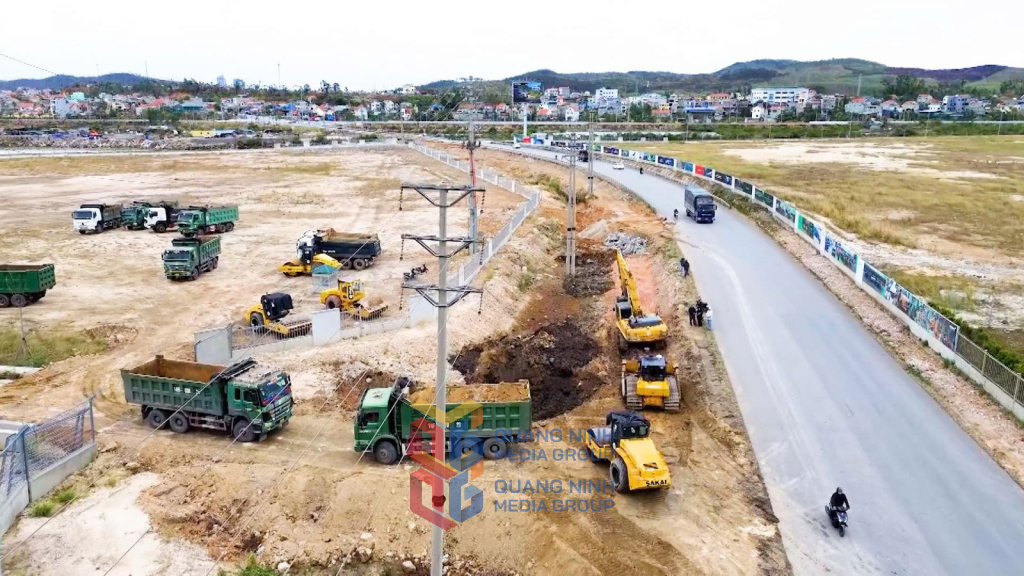(MPI) - Pursuant to Decision No. 622/QD-TTg dated May 10, 2017 of the Prime Minister on promulgating the National Action Plan to implement the 2030 Agenda for Sustainable Development, the Ministry of Planning and Investment has developed a Report on the implementation of sustainable development goals to submit to the Government and the National Assembly. Accordingly, in the past time, the Ministry of Planning and Investment has coordinated with ministries, branches, localities and relevant agencies to develop a Report on the implementation of sustainable development goals in 2023 (SDGs Report 2023).
The report stated that according to the global ranking of the SDGs Index, in 2023, Vietnam scored 73.3 and ranked 55th out of 166 ranked countries. Vietnam's score continued to improve compared to 2022 but the position has not changed.
The report focuses on analyzing the highlights and new points related to the implementation of the goals in 2023 such as the policies issued and implemented, the results of implementing some indicators with updated data, limitations and shortcomings in implementing the goals. These contents will be presented throughout each goal based on information synthesized from the Report on the assessment of the implementation of the sustainable development goals in 2023 of the ministries and branches assigned to preside over the goals according to Decision No. 622/QD-TTg of the Prime Minister and at the same time refer to related reports.
Accordingly, the report assesses the implementation of 17 sustainable development goals by 2030, including: (1) Ending all forms of poverty everywhere; (2) Ending hunger, ensuring food security, improving nutrition and promoting sustainable agriculture; (3) Ensuring healthy lives and promoting well-being for all at all ages; (4) Ensuring inclusive, equitable and quality education and promoting lifelong learning opportunities for all; (5) Achieving gender equality; empowering and creating opportunities for women and girls; (6) Ensuring availability and sustainable management of water resources and sanitation for all; (7) Ensuring access to affordable, reliable and sustainable energy for all; (8) Ensuring sustained, inclusive and sustainable economic growth; creating full and productive employment and decent work for all; (9) Building resilient infrastructure, promoting inclusive and sustainable industrialization, enhancing innovation; (10) Reducing social inequality; (11) Developing sustainable and resilient urban and rural areas; ensuring safe living and working environments, and rationally allocating population and labor by region; (12) Ensuring sustainable production and consumption; (13) Responding promptly and effectively to climate change and natural disasters; (14) Conserving and sustainably using oceans, seas and marine resources for sustainable development; (15) Protecting and developing sustainable forests, conserving biodiversity, developing ecosystem services, combating desertification, preventing degradation and restoring land resources; (16) Promoting a peaceful, democratic, equitable, egalitarian and civilized society for sustainable development, creating access to justice for all; Building effective, accountable and participatory institutions at all levels; (17) Strengthening implementation modalities and promoting global partnerships for sustainable development.
In general, ministries, branches and localities continue to seriously implement assigned tasks according to the National Action Plan to implement the 2030 Agenda for Sustainable Development. The implementation of SDGs in 2023 continues to achieve certain results, reflected in some outstanding indicators such as poverty reduction. In 2023, social security systems and measures, including social security floor policies, continue to be effectively implemented nationwide. The settlement and payment of social insurance, unemployment insurance and health insurance regimes and policies are always given attention, ensuring full and timely payment to each participant and beneficiary, thereby contributing to supporting and stabilizing the lives of workers. Accordingly, the poverty rate according to the multidimensional poverty standard in 2023 will be 3.2% (down 1.1% compared to the end of 2022); 100% of social protection beneficiaries are eligible for monthly social allowances; 100% of people affected by natural disasters, floods, and hunger receive timely emergency assistance, no one goes hungry; more than 90% of people with disabilities in difficult circumstances. The global ranking on SDGs implementation is built and published annually in the Sustainable Development Report with timely social assistance, care, and rehabilitation; more than 90% of elderly people in difficult circumstances receive timely social assistance, care, and care, achieving the target.
However, the poverty reduction results are high but not sustainable, poor households are prone to falling back into poverty or new poverty; the coverage rate of social insurance and health insurance tends to grow slowly. Therefore, in the coming time, it is necessary to continue researching and perfecting the multidimensional poverty standard associated with the goal of sustainable development, ensuring a gradual increase in the minimum living standard and the ability to access basic social services of the people in the period up to 2030.
Regarding the target of economic growth and sustainable employment, according to the report, in the past year, all levels, sectors and localities have drastically, synchronously, substantially and effectively implemented the tasks and solutions set out for economic development. Sectors and fields continue to be restructured, in which the agricultural sector is promoted, encouraging the development of green, clean, ecological, organic, circular, high-tech, smart agriculture, adapting to climate change. In 2023, the GDP growth rate will reach 5.05%, lower than in 2022 (8.02%) and the set target but at a high level in the world and in the region; GDP scale at current prices continues to increase, estimated at 10,221.8 trillion VND, equivalent to 430 billion USD, entering the group of upper middle-income countries; Labor productivity of the entire economy at current prices is estimated at 199.3 million VND/worker (an increase of 274 USD compared to 2022).
The legal system has been improved, ensuring effective implementation of the 2013 Law on Employment, piloting the first national online job exchange, promptly supporting people and workers who have lost their jobs or had their working hours reduced. Accordingly, the unemployment rate continues to remain at 2.1%; the average monthly income of workers is 7.1 million VND, an increase of 6.9% compared to 2022.
Regarding industry, innovation and infrastructure: The capacity of the transport infrastructure system has been gradually synchronized and modernized, creating a reasonable and effective transport structure, contributing to limiting traffic accidents nationwide, reducing traffic congestion in major cities, ensuring connectivity between regions in the country and international trade, creating momentum for socio-economic development, contributing to creating a new look for the country. Accordingly, in 2023, 475 km of expressways were put into use, bringing the total length of expressways put into operation to nearly 1,900 km. Although solutions to develop the processing and manufacturing industry continue to be promoted, the proportion of added value of the processing and manufacturing industry in GDP reached 23.88%, lower than the annual plan target (25.4-25.8%).
Legal regulations related to credit activities are regularly reviewed and improved, and the number of small and medium enterprises with outstanding credit at credit institutions is estimated at 260,400 enterprises. Financial resources for science and technology activities continue to receive attention at all levels of government. Investment in developing information and communication infrastructure for remote, mountainous and island areas is promoted, with about 1.6 million poor/near-poor households supported to use either terrestrial mobile telecommunications services or fixed broadband internet access services.
Regarding climate actions, in 2023, the National Steering Committee for the implementation of Vietnam's commitments at COP26 resolutely directed the implementation of strategies, plans, and action programs to respond to climate change, reduce greenhouse gas emissions, and transform energy, aiming to achieve net zero emissions by 2050. Accordingly, Vietnam announced the Resource Mobilization Plan for the Implementation of JETP (RMP) at COP 28, which is considered the basis for attracting support from international partners and international institutions for the implementation of equitable energy transition projects. Communication work to raise public awareness, mobilize resources, and involve the whole society in responding to climate change and mitigating natural disaster risks continues to be promoted.
Forms of popularizing environmental laws in general and activities on climate change response, disaster risk prevention and mitigation in particular have been approached and innovated. Disaster prevention infrastructure such as monitoring stations, dykes, reservoirs, irrigation works, boat anchorage areas, etc. continue to be invested in and effectively promoted. However, many legal documents mention climate change but are not specific, lack implementation guidance documents, especially for assessing the impact of climate change on each sub-sector; lack of regulations and standards on climate change adaptation in project design; limited mechanisms for sharing information and data on climate change; no priority policies for climate change adaptation activities of sectors.
Regarding partnerships for sustainable development: Vietnam is implementing its commitments on preferential export taxes and special preferential imports within the framework of 15 FTAs. Vietnam's average preferential import tax rate in 2023 will be about 11.9% (down 5.5% compared to the average of 17.4% at the time of joining the WTO in 2007). Vietnam's import and export activities in 2023 will not meet expectations. In 2023, total import and export turnover will reach 681.1 billion USD, down 6.6% over the previous year, of which exports will decrease by 4.4%; imports will decrease by 8.9%. However, the trade balance will continue to record a trade surplus for the 8th consecutive year, reaching about 28.3 billion USD, 2.3 times higher than in 2022.
Economic diplomacy and international economic integration have been proactively, actively, systematically and comprehensively implemented, actively seeking and mobilizing external resources for national development. Total registered foreign direct investment (FDI) in Vietnam in 2023 reached nearly 36.6 billion USD, up 32.1% in the context of shrinking global trade and investment./.
Source: https://www.mpi.gov.vn/portal/Pages/2024-7-31/Tinh-hinh-thuc-hien-cac-muc-tieu-phat-trien-ben-vutdzhr2.aspx



















Comment (0)